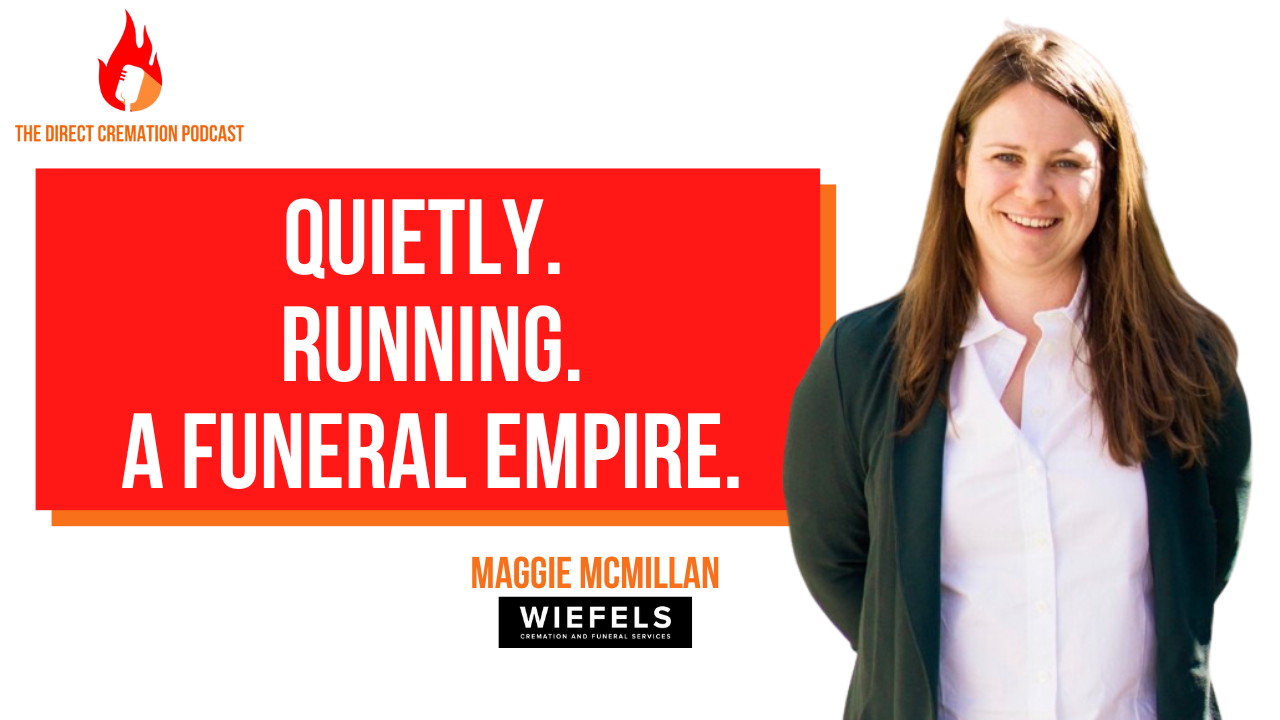Why Raising Prices & Losing Customers Can Still Make More Money | Maggie McMillan (Wiefels) #39
In death care, there are seasons when you can pace yourself and moments when you need to sprint. For Maggie McMillan, Vice President of Wiefels Family of Businesses and former president of the Association of California Cremationists, success means knowing when to shift gears.
In her conversation on The Direct Cremation Podcast with hosts Tyler Yamasaki (CEO of Parting Pro) and Will de Michelis (funeral home consultant), Maggie shares insights on running multiple brands, staying competitive in crowded markets, and navigating the evolving landscape of cremation and funeral services.
Knowing When to Sprint
Early in her career, Maggie learned that not every business challenge requires the same pace. Most of the time, funeral home management is a marathon, building relationships, fine-tuning processes, and steadily growing market share. But when a new competitor opens down the street or market share starts to slip, it’s time to sprint.
“I’ll go out and meet five families a week if I have to,”
Maggie explains.
“Sometimes you need to be the face of the value your brand delivers.”
That balance between empowering her counselors and stepping in personally has been key to sustaining both traditional funeral homes and online cremation services under her leadership.
Serving Multiple Markets Under One Roof
The Wiefels Family of Businesses operates traditional funeral homes, online cremation services, and specialty cremation websites with their own dedicated teams.
Maggie’s approach to funeral home software and funeral arrangement software focuses on meeting each family where they are. For a high-volume online cremation brand, that means leveraging tools like online funeral arrangements to streamline repetitive tasks, reduce time on the phone, and improve efficiency. For a brick-and-mortar funeral home, it means providing more personalized, in-person care.
The two models even cross-refer families when needed. If a family on the high-volume side clearly needs more personalized attention, staff connect them to a traditional location. Likewise, if a traditional arrangement would better fit an online customer’s needs or budget, they make that introduction.
Why Competitors Can Be Your Best Teachers
One of Maggie’s most refreshing perspectives is that “competitors are just smart friends you can learn from.” In her experience, good relationships with other funeral providers, even direct competitors, can spark innovation, uncover market trends, and strengthen the profession as a whole.
This collaborative spirit has helped her stay ahead of changes in funeral tech and cremation advertising, while also maintaining a strong presence in her community.
Avoiding the Race to the Bottom
The conversation turned to pricing, a topic many funeral arrangers struggle with. Maggie reflected on the “race to the bottom” in cremation pricing over the past decade, when providers felt they had to be the cheapest to compete.
That approach, she warns, can undermine service quality and staff pay, especially in high-cost areas like Southern California. Raising prices strategically, while clearly communicating value, has helped her businesses offer competitive wages and reduce burnout without losing families to competitors.
“Families are willing to pay more when you can explain why,” Maggie says. “Whether it’s having a real person answer the phone or providing a faster turnaround, value matters.”
Adapting to Industry Trends
Maggie is closely watching emerging trends in funeral service software and disposition methods. While cremation remains dominant, often over 80% of cases in her markets, she’s curious about the potential of aquamation and other eco-friendly options.
Her team also operates a natural burial cemetery, opened in 2007, which has seen steady growth thanks to targeted outreach and community education. As new forms of disposition gain legal approval in California, she anticipates a more diversified market rather than a complete shift away from cremation.
Online Presence and FTC Price Rule Changes
With the Federal Trade Commission considering rules that would require funeral homes to post prices online, Maggie sees opportunity rather than threat. Wiefels has had pricing on its websites for years, which she says improves transparency and makes it easier for families to self-select the right service level.
For smaller family-owned funeral homes, she encourages leaning into community connections and personal service when building a funeral website. Sharing your values, such as paying above-minimum wages, hiring locally, or reflecting the diversity of your community, can help differentiate you from large corporate competitors.
Balancing Leadership and Quality of Life
Maggie’s management philosophy is built on trust and empowerment. By delegating day-to-day operations to strong managers and investing in training, she ensures her team can provide consistent service whether they’re using crematory software to process a high-volume caseload or arranging a multi-day memorial.
She also recognizes that burnout is real in death care. Clear workflows, the right funeral home management system, and reasonable staffing levels are critical to keeping morale high and turnover low.
Key Takeaways for Funeral Professionals
- Match your pace to the moment – Know when to lean in personally and when to empower your team.
- Different models need different tools – Best funeral home software for a high-touch traditional location may not be the same as the best online cremation software for a web-based brand.
- Build alliances, not silos – Competitors can inspire new ideas and solutions.
- Price with confidence – Don’t be afraid to raise rates when you can communicate value.
- Lead with transparency – Whether through funeral planning software or a well-built funeral website, clear information builds trust.
Maggie’s perspective is a reminder that whether you’re running a single funeral home or a multi-brand operation, adaptability and authenticity matter more than shortcuts. In her words:
“I haven’t found a shortcut to not having to do the work or engage with your community, and I’m not sure one exists.”
🎧 Watch the full episode with Maggie McMillan here: http://youtube.com/watch?v=9B3_xk9w0Dk

